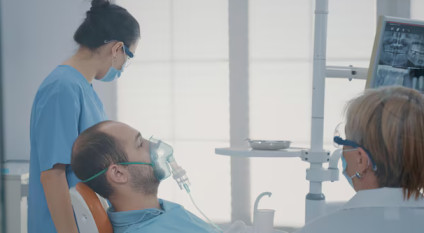Sedation dentistry can transform dental visits into a stress-free experience. It’s ideal for patients who experience dental anxiety, have a sensitive gag reflex or need extensive work.
There are several levels of sedation available including nitrous oxide, oral sedation and general anesthesia. This article will explore the different types of sedation available and how they work.
Nitrous Oxide
Nitrous oxide, commonly known as laughing gas, is a safe and quick-acting sedative. Patients breathe the odorless gas through a mask over their nose or mouth to begin feeling relaxed within seconds. The dentist can monitor the effects of nitrous oxide and adjust it throughout your procedure. This option is perfect for people with anxiety about a short procedure.
Nitrous Oxide doesn’t induce sleep, but it does cause drowsiness. It’s also a good choice for people who might feel uncomfortable lying down for long periods of time or for those with limited mobility.
Nitrous oxide isn’t addictive, but it can make you hungover if you use it too often. You should plan on having someone drive you home after your appointment if you’re receiving this form of sedation. Also, smoking can interfere with the effectiveness of nitrous oxide. This form of sedation is sometimes used along with analgesics, which help reduce pain and discomfort.
Oral Sedation
A pill-based form of sedation, oral sedation allows patients who would otherwise avoid dental treatment due to extreme fear or anxiety to receive necessary care. It works by lowering the patient’s stress levels while local anesthesia blocks pain. It also helps control the gag reflex, allowing patients to remain calm and comfortable throughout their appointments.
The dentist will prescribe a medication for the patient to take an hour or so before their appointment. This medication will typically be a diazepam like triazolam (Halcion(r)) or zaleplon (Sonata(r)). Oral conscious sedation can make patients feel so relaxed that they fall asleep, but they will be woken up if the dentist needs them to open their mouth or turn their head.
The dentist will carefully review the patient’s medical history to ensure that they do not have any conditions that could be aggravated by the medication or its side effects. The dentist will also administer a pregnancy test as some medications can be harmful to an unborn baby.
How Does Sedation Dentistry Work?
Depending on your procedure, your dentist will recommend either oral or IV sedation. With oral sedation, you take a pill an hour before your appointment that makes you sleepy or groggy. Your dental professional may use medications like triazolam (Halcion(r)), zaleplon, or lorazepam. For children, they might give liquid sedation such as midazolam oral syrup. This type of sedation puts you in a deep state of relaxation and allows you to fall asleep during your procedure. It is best for patients with extreme anxiety and those undergoing lengthy procedures.
Sedation dentistry is safe and effective when administered by a qualified sedation dentist Smithfield VA. It can provide a positive dental experience, leading to better dental hygiene habits and more regular visits to the dentist in the future. For more information on the benefits of sedation dentistry, contact Legacy Dental in Omaha, led by Dr. Lauren Semerad and Dr. Maggie Larsen, who are highly skilled in sedation techniques.
Is Sedation Dentistry Safe?
Sedation dentistry Smithfield VA allows individuals with dental anxiety or fears about specific procedures to receive the necessary treatment in a comfortable and stress-free manner. The sedation used in sedation dentistry is safe, and the dentists who perform it are trained to ensure that patients do not experience any complications with their procedure. However, there are some risks associated with sedation, and certain health conditions and medications may increase the risk of a sedative-related side effect.
To avoid these issues, a patient should inform their dentists of any pre-existing medical conditions that could affect their suitability for sedation dentist Smithfield VA. This includes any medications, especially those that suppress the nervous system or cause drowsiness. Also, it is important to arrange for someone to drive you home after your appointment because sedation effects may linger, making driving unsafe. A complete list of current medications should also be provided to the dentist as some sedatives can interact with other drugs and cause undesired or unpredictable effects.
























